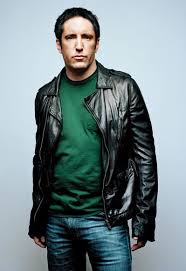skip to main |
skip to sidebar
About a week ago I heard a promo for NPR’s All things Considered which advertised an upcoming interview with Trent Reznor of Nine Inch Nails. I enjoyed the on-air portion but it left me wanting more. Fortunately they posted the long form here. Maybe it's just because I'm a music nerd but I thought the best parts were left out of the broadcast edit. For instance he talked about what I've begun referring to as "crowd-source criticism".
 |
| Trent Reznor |
Reznor said, "I think we live in very dangerous times right now... with the Internet and the feedback loop you can get from people who somehow feel their fingers are connected to an impulse — first second of hearing something, I need to write some reaction that gets blasted out to the world." It's essentially what I'm doing right now; critiquing an interview that, in part, discusses a critique. Is my criticism more valid because of my past credentials or is the reporter more valid because she works for NPR? Do you need to have credentials other than the support of the crowd? It seems not, but a lot of snarky and ugly stuff does get pushed to the surface when the crowd is the only determiner of quality.
I started in the small press, which was the internet for people born before 1980. When I started we had trouble getting press passes and were looked down upon by publicists and “real” journalists. I actually found that small press (I wrote a lot for regional entertainment papers) had a harder time getting treated as members of the press than did my community college newspaper. I found this terribly frustrating at times, especially when I would see an interview with a major act that I hadn’t been able to get. In one instance in particular the publicist for a punk rock icon said I could interview his guitar player if I wanted, but the icon himself was interviewed by a major publication that did a truly awful job. Having that experience, I’m interested in what makes criticism or commentary worthwhile. Snark, unfortunately, gets a lot of eyeballs these days, but there is also a lot of truly poor journalism on the websites and in the pages of major media outlets.
When Reznor lamented, "I could spend a lot of time being frustrated about one aspect of the press, which is what low qualifications are required to become a quote-unquote journalist these days.", I wanted to hear more of that discussion. Unfortunately the journalist didn’t dig as deeply as I would have liked. This was also within a couple of days of AP making, at least to Nine Inch Nails fans, a huge attribution mistake regarding Johnny Cash’s cover of the NIN song “Hurt”. Perhaps the NPR interview was conducted before that story broke and broadcast later, but it was a wonderful coincidence that this happened at AP, an organization that should have the best qualifications and processes, within days of Reznor challenging the threshold of journalistic qualification.
I hope someone does another Reznor interview soon and really sounds him out with regard to what is journalism and what is criticism and how it is different from what we do on Facebook and other social media sites. Is crowd-source criticism more or less legitimate if it lacks journalistic credentials? Those are topics I'd love to hear discussed in detail.








.jpg)